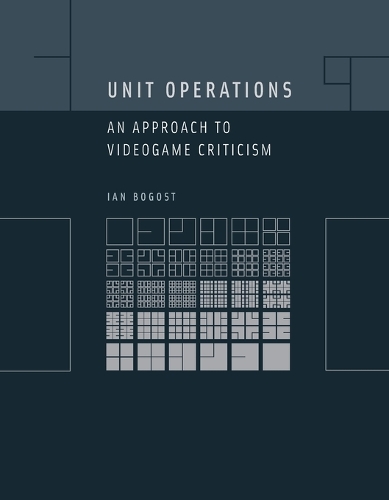
Unit Operations: An Approach to Videogame Criticism
(Paperback)
Publishing Details
Unit Operations: An Approach to Videogame Criticism
By (Author) Ian Bogost
MIT Press Ltd
MIT Press
25th January 2008
United States
Classifications
Professional and Scholarly
Non Fiction
Computer games design
Media studies: internet, digital media and society
Computer games / online games: strategy guides / companion works
306.487
Physical Properties
Paperback
264
Width 178mm, Height 229mm, Spine 13mm
431g
Description
In Unit Operations, Ian Bogost argues that similar principles underlie both literary theory and computation, proposing a literary-technical theory that can be used to analyze particular videogames. Moreover, this approach can be applied beyond videogames- Bogost suggests that any medium-from videogames to poetry, literature, cinema, or art-can be read as a configurative system of discrete, interlocking units of meaning, and he illustrates this method of analysis with examples from all these fields. The marriage of literary theory and information technology, he argues, will help humanists take technology more seriously and hep technologists better understand software and videogames as cultural artifacts. This approach is especially useful for the comparative analysis of digital and nondigital artifacts and allows scholars from other fields who are interested in studying videogames to avoid the esoteric isolation of "game studies."The richness of Bogost's comparative approach can be seen in his discussions of works by such philosophers and theorists as Plato, Badiou, Zizek, and McLuhan, and in his analysis of numerous videogames including Pong, Half-Life, and Star Wars Galaxies. Bogost draws on object technology and complex adaptive systems theory for his method of unit analysis, underscoring the configurative aspects of a wide variety of human processes. His extended analysis of freedom in large virtual spaces examines Grand Theft Auto 3, The Legend of Zelda, Flaubert's Madame Bovary, and Joyce's Ulysses. In Unit Operations, Bogost not only offers a new methodology for videogame criticism but argues for the possibility of real collaboration between the humanities and information technology.
Reviews
"Bogost challenges humanists and technologists to pay attention to one another, something they desperately need to do as computation accelerates us into the red zones of widespread virtual reality. This book gives us what we need to meet that challenge: a general theory for understanding creativity under computation, one that will apply increasingly to all creativity in the future. Not only that, but we get an outstanding theory of videogame criticism in the mix as well. Highly recommended."--Edward Castronova, Department of Telecommunications, Indiana University, author of *Synthetic Worlds: The Business and Culture of Online Games*
Author Bio
Ian Bogost is Ivan Allen College Distinguished Chair in Media Studies and Professor of Interactive Computing at the Georgia Institute of Technology, a Founding Partner at Persuasive Games LLC, and the coauthor of Newsgames- Journalism at Play (MIT Press, 2010).
